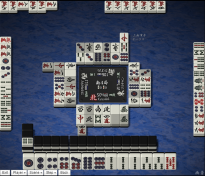Sashikomi: Difference between revisions
No edit summary |
mNo edit summary |
||
| (4 intermediate revisions by 2 users not shown) | |||
| Line 1: | Line 1: | ||
[[Image:Sashikomi.png|thumb|205px|right|[http://tenhou.net/0/?log=2015071312gm-0089-0000-c9d124b2&tw=2&ts=9 Sashikomi utilized] with minimal risk of [[gyakuten]].]] | [[Image:Sashikomi.png|thumb|205px|right|[http://tenhou.net/0/?log=2015071312gm-0089-0000-c9d124b2&tw=2&ts=9 Sashikomi utilized] with minimal risk of [[gyakuten]], while ending the game.]] | ||
'''Sashikomi''' {{kana|差し込み}} is the deliberate act of dealing dangerous tiles | '''Sashikomi''' {{kana|差し込み}} is the deliberate act of dealing dangerous tiles in order for another player to win the hand. Normally, players with a large enough point difference can afford the point loss and retain placement. The primary purpose of this strategy is to either force a wind rotation or outright end the game. | ||
==Usage== | |||
To use this strategy, a player must either have a sizable lead, a marginal point lead vs the next player in placement, and/or familiarity with the [[scoring table]]. Furthermore, the player must defend against certain players, or the strategy is rendered moot. For example, in the [[oorasu|last hand]] of the game, players should defend against the last dealer in order to prevent [[renchan|additional hands]]. Otherwise, the last dealer has a chance to win the game by winning enough consecutive and/or large enough hands as the last dealer. | |||
== External links == | == External links == | ||
[[Category:Strategy]] | |||
[[Category:Terminology]] | |||
{{Navbox strategy}} | {{Navbox strategy}} | ||
Revision as of 04:28, 18 March 2024

Sashikomi 「差し込み」 is the deliberate act of dealing dangerous tiles in order for another player to win the hand. Normally, players with a large enough point difference can afford the point loss and retain placement. The primary purpose of this strategy is to either force a wind rotation or outright end the game.
Usage
To use this strategy, a player must either have a sizable lead, a marginal point lead vs the next player in placement, and/or familiarity with the scoring table. Furthermore, the player must defend against certain players, or the strategy is rendered moot. For example, in the last hand of the game, players should defend against the last dealer in order to prevent additional hands. Otherwise, the last dealer has a chance to win the game by winning enough consecutive and/or large enough hands as the last dealer.
External links
| |||||||||||